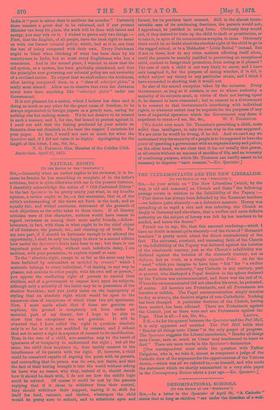NATURAL RIGHTS.
(TO THE EDITOR OF THE " SPECTATOR:1
Sin,—Generally when an author replies to his reviewer, it is be- cause he fancies he has something to complain of in the latter's criticism, but it is quite otherwise with me in the present instance. I cheerfully acknowledge the notice of " Old-Fashioned Ethics" in the last Spectator to be pretty nearly just what, in my humble opinion, a review ought to be,—a fair statement, that is, of the critic's understanding of the views set forth in the book, and an equally fair, and withal courteous, statement of the grounds of such objections as the critic takes to those views. If all literary criticism were of this character, authors would have reason to regard reviewers as among their most useful friends,—fellow- labourers, in fact, with them in what ought to be the chief object of all literature, the pursuit, viz., and clearing-up of truth. For my own part, if I should be fortunate enough to be allowed the opportunity, I shall be only too happy to show in a second edition how useful the Spectator's hints have been to me ; but there is one important point on which, without such indefinite delay, I am anxious, with your permission, to explain myself at once.
To the "absolute right, except in so far as the same may have been forfeited by misconduct or modified by consent," which I maintain belongs to every individual, "of dealing in any way he pleases, not noxious to other people, with his own self or person," you oppose the conflicting right of parents to control their children, and of a government to impose laws upon its subjects, although only a minority of the latter may be in possession of the elective franchise ; and you justly insist on the impropriety of styling that an absolute right which would be open to the numerous class of exceptions of which these two are specimens. Now, I must needs admit that if these are genuine ex- ceptions, the ground is completely cut from under an essential part of my theory, but I hope to be able to show that the exceptions are not genuine. It will be observed that I have called the right in question absolute only in so far as it is not modified by consent, and I submit that not to assert a right is a species of consent to its modification. True, in the case of a child, non-assertion may be the result of ignorance of or incapacity to understand the right ; but all the same, the child does acquiesce in, does tacitly consent to the interference of its parents with the right. If, however, a child could be conceived capable of arguing the point with its parents, and contending that its person was its own, not theirs, and that the fact of their having brought it into the world without asking its leave was no reason why they, instead of it, should decide how it should be dealt with, I do not see how the child's logic could be refuted. Of course it could be met by the parents replying that if it chose to withdraw from their control, they should withdraw their support, leaving it to shift for itself for food, raiment, and shelter, whereupon the child would be pretty sure to submit, and to substitute open and I formal, for its previous tacit consent. Still in the almost incon- ceivable case of its continuing fractious, the parents would not,. I apprehend, be justified in using force. Obviously they would not, if they desired to train up the child to theft or prostitution, or to take it, in spite of its conscientious scruples, to mass. Obviously there could be no doubt about the absolute right of the child to go to the ragged school, or to a Methodist" Little Bethel" instead. But if not in these, how in any other matters affecting itself alone, could the parents be morally justified in preventing an exceptional child, content to forego their protection, from acting as it pleased ? The case of such a child is not very likely to occur, and I have only imagined it, for the purpose of seeing whether, if it did, it wduld subject my theory to any particular strain, and I think I have succeeded in showing that it would not.
So also of the second exception taken by the reviewer. Every Government, as long as it subsists, is one to whose authority a majority of its subjects must, in virtue of their not having upset it, be deemed to have consented ; but to consent to a Government is to consent to that Government's interfering with individual rights, to whatever extent may be requisite for the purposes of any laws of impartial operation which the Government may deem it expedient to enact.—I am, Sir, &c., W. T. THORNTON.
[We doubt very much Mr. Thornton's permitting a child, more wilful than intelligent, to take its own way in the case supposed. We are clear lie would be wrong, if be did. And we can't say we understand why the majority of a people is to be supposed to have the power of upsetting a government with an organised army and police ;. on the other hand, we are clear that it has not usually that power, at all events without an amount of sacrifice of life, and an intensity of combining purpose, which Mr. Thornton can hardly assert to be necessary to disprove "tacit consent."—En. Spectator.]


































 Previous page
Previous page